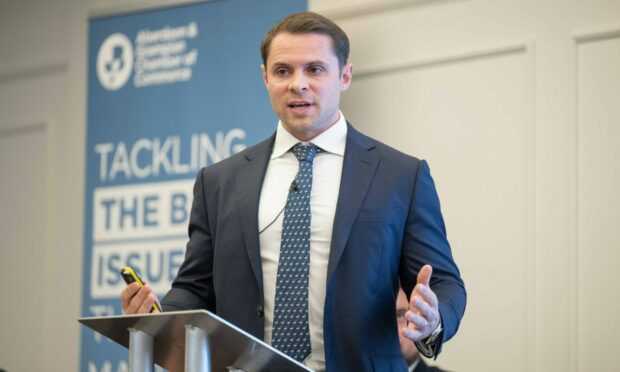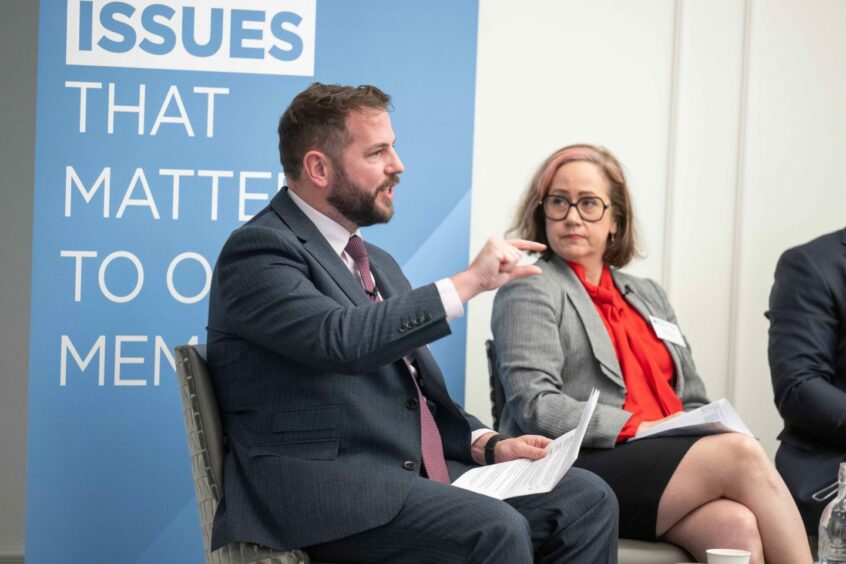Businesses and households are facing a winter of gloom, but not doom, as energy prices soar and costs of lending rise, a leading economist has said.
Instead, conditions will hit harder in the winter of 2023/24 as savings stored up by households during the pandemic is spent on more expensive goods and services, and interest rates rises are baked into higher mortgage and debt repayments for years to come.
This was the prediction of Tom Pugh, UK economist at accounting firm RSM, who was speaking to a group of around 200 business leaders at an event hosted by Aberdeen and Grampian Chamber of Commerce (AGCC).
The UK government’s recent massive stimulus – where new Prime Minister Liz Truss and Chancellor Kwasi Kwarteng slashed taxes by £45 billion and said that the total bill for the Government’s energy package would amount to £60bn for the six months from October – will ease the impact of an expected recession this winter.
Costs will rise because government has ‘kicked the can’ on debt
Households and businesses still face massive rises in costs, despite the UK government’s move to cap energy prices, Mr Pugh pointed out.
And while he said an interest rate rise to 6% by January was a “toppy” estimate, he did not rule it out – at this level of bank rates “we start having problems with the housing market and we see business going under” he said.
Nevertheless, he said: “The winter is not going to be that bad.
“But the risk is what the government has done is kicked the can down the road and stored up that pain.
“Normally there is a 12-month lag between raising interest rates and then having an impact on the economy.
“So the super-sized rates hikes we have seen in the last few meetings and we will likely see in the rest of the year won’t have an impact until end of next year – especially as people will have remortgaged or refinanced at a much higher rate.”
The government has kicked the can down the road and stored up that pain.”
He added households had built up a “huge pot of savings” during the pandemic – “fast-forward a year how long will these savings last?” Lower income households will feel this strain the worse.
He added: “Next winter is where we see the red flags show.”
Ryan Crighton, director of policy and marketing at AGCC, introduced the event with a quote made by the late, great Queen Elizabeth II: “Change has become a constant; managing it has become an expanding discipline. The way we embrace it defines our future.”
He added: “She said that after her golden jubilee in 2002, but I don’t think even she knew just how constant change would become in the decades which followed.
“If someone had pitched a science fiction movie five years ago with some of the things that have happened in that period, I think people would have laughed.
“Brexit, the pandemic, war in Europe, a climate emergency, inflation like we haven’t seen since the 1970s, large scale industrial action and possible break up of the UK.
“And even in the short time since we announced this breakfast we have a new Prime Minister, a new government and new monarch, Russia threatening to nuke the west and America threatening to nuke Russia and even a Scottish International Football side which is winning – strange times indeed.”
Latest budget event ‘bombshell’
He added that Friday’s mini-Budget was a “bombshell” that will “define our economy and our politics for years to come.
Speaking on First Minister Nicola Sturgeon’s dismissal of calls to meet tax cuts – including the scrapping of the higher rate of tax, he said: “Scottish Government should ensure Scotland doesn’t lag behind the UK as a high tax low growth neighbour.”
Fergus Mutch, managing partner of advisory firm True North and a former head of communications for the SNP was on the panel at the event.
Will Scots pay more tax than rest of UK?
Nicola Sturgeon yesterday branded Mr Kwarteng’s “growth plan” as being “morally repugnant”, seemingly ruling out falling in line with Westminster’s radical tax cuts.
Mr Mutch noted that Scotland’s divergence in policy would mean that people on salaries of £29,00o would pay higher taxes than those on the same salaries as other parts of the UK.
“You would also find people on £50,000 facing considerable, several thousands pounds of liabilities,” he added.
He said that while the Scottish Government could mirror the UK government’s income tax cuts it would cost it £400m per annum.
The Scottish Parliament has powers to set different rates of income tax compared with the rest of the UK and is under pressure to align rates with the UK.
“It could be economically a good thing to follow suit and abolish it,” Mr Mutch said.
“There is only 22,000 additional rates taxpayers in Scotland – so paying them a few pence less on income above £150,000 will not really have a significant effect in aggregate.”
He added: “If the Scottish Government retains that additional rate, the accusation then becomes the Scottish Government is undermining the competitiveness of the Scottish economy for no new revenue gain. That is a tricky circle to square for Nicola Sturgeon.”




Conversation